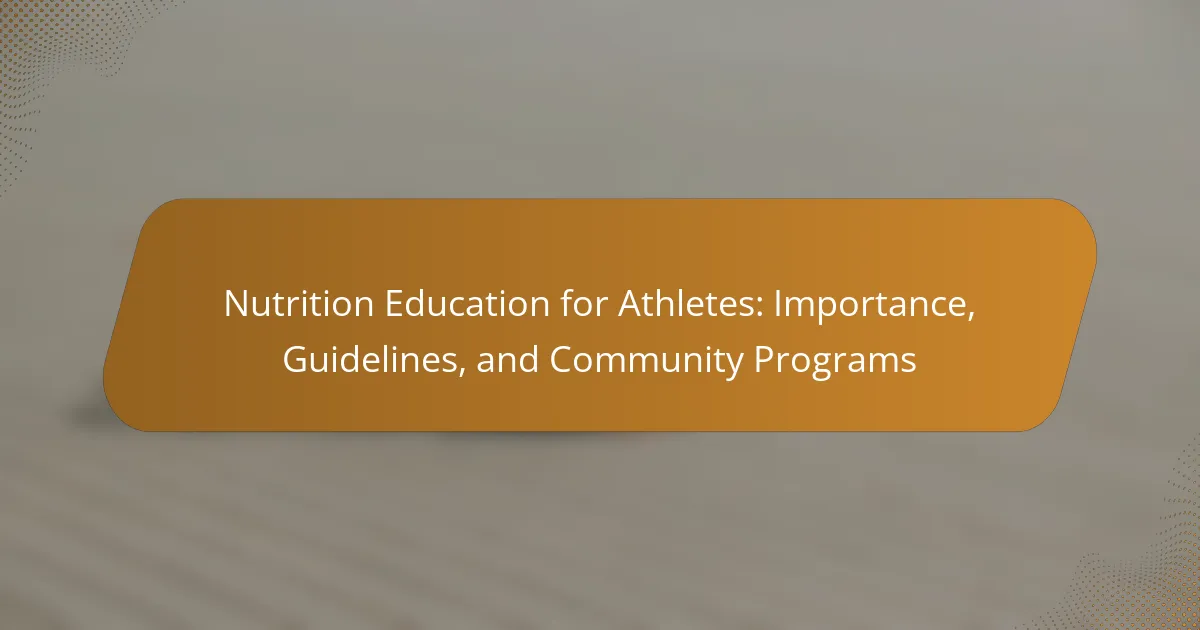Nutrition education is essential for athletes to enhance performance, recovery, and overall health. This article explores the importance of balanced nutrition, hydration, and meal timing. It also highlights community programs that provide tailored resources and support, addressing the unique challenges athletes face in maintaining optimal dietary practices. By focusing on evidence-based guidelines, athletes can make informed choices that align with their training goals.

Why is Nutrition Education Crucial for Athletes?
Nutrition education is crucial for athletes as it enhances performance, recovery, and overall health. Proper nutrition strategies can optimize energy levels and prevent injuries. Athletes who understand nutrition can make informed choices that align with their training goals. Community programs that focus on nutrition education can provide essential resources and support, fostering a culture of health and wellness among athletes.
What are the Key Benefits of Nutrition Education for Athletic Performance?
Nutrition education enhances athletic performance by optimizing diet, improving recovery, and preventing injuries. Athletes who receive proper nutrition guidance experience better energy levels, increased endurance, and enhanced mental focus. Research indicates that tailored nutrition plans can lead to a 10-20% improvement in performance metrics. Additionally, education fosters long-term healthy eating habits, benefiting athletes beyond their competitive years. Community programs that promote nutrition education further support athletes by providing resources and access to expert advice.
How Does Nutrition Impact Recovery and Injury Prevention?
Nutrition significantly impacts recovery and injury prevention by providing essential nutrients that facilitate healing and strengthen the body. Adequate protein intake supports muscle repair, while carbohydrates replenish glycogen stores. Hydration is crucial for maintaining performance and reducing injury risk.
Athletes should focus on a balanced diet rich in vitamins and minerals, particularly antioxidants, which can reduce inflammation. Community programs that educate athletes on proper nutrition can enhance their understanding and application of these guidelines, ultimately improving their performance and longevity in sports.

What Guidelines Should Athletes Follow for Optimal Nutrition?
Athletes should follow guidelines that emphasize balanced nutrition, hydration, and meal timing. Proper intake of macronutrients—carbohydrates, proteins, and fats—supports performance and recovery.
1. Prioritize carbohydrates for energy, aiming for 6-10 grams per kilogram of body weight daily.
2. Include lean proteins, targeting 1.2-2.0 grams per kilogram of body weight for muscle repair.
3. Incorporate healthy fats, constituting 20-35% of total caloric intake.
4. Stay hydrated before, during, and after exercise, with fluid intake tailored to individual sweat rates.
5. Plan meals around training sessions to optimize energy levels and recovery.
6. Consider community nutrition programs for additional support and education on optimal dietary practices.
Which Macronutrients are Essential for Athletes?
Athletes require three essential macronutrients: carbohydrates, proteins, and fats. Carbohydrates provide energy for performance, proteins support muscle repair and growth, and fats contribute to overall health and sustained energy.
Carbohydrates should make up 45-65% of an athlete’s daily caloric intake. They are vital for maintaining glycogen stores, which fuel endurance activities. Proteins are crucial for muscle recovery, with recommendations of 1.2-2.0 grams per kilogram of body weight, depending on the sport’s intensity. Fats, comprising 20-35% of total calories, are important for hormonal balance and energy during prolonged exercise.
Incorporating a balanced diet rich in these macronutrients enhances athletic performance and supports overall well-being.
How to Create a Balanced Meal Plan for Different Types of Athletes?
Creating a balanced meal plan for athletes involves considering their specific energy and nutrient needs. Tailor the plan based on the athlete’s sport, training intensity, and individual goals.
1. Assess energy requirements: Calculate daily caloric needs based on activity level and body composition goals.
2. Include macronutrients: Balance carbohydrates, proteins, and fats according to the athlete’s energy demands, typically 50-60% carbs, 15-20% protein, and 20-30% fats.
3. Optimize meal timing: Schedule meals and snacks around training sessions to enhance performance and recovery.
4. Incorporate hydration: Ensure adequate fluid intake before, during, and after exercise to maintain optimal hydration levels.
5. Customize food choices: Select nutrient-dense foods that align with the athlete’s preferences and dietary restrictions.
This approach ensures athletes receive the necessary nutrients to support their performance and recovery.
What Role do Supplements Play in an Athlete’s Diet?
Supplements play a crucial role in an athlete’s diet by enhancing performance, recovery, and overall health. They provide essential nutrients that may be lacking in regular food intake, such as vitamins, minerals, and protein. For example, protein supplements can support muscle repair after intense training. Additionally, certain supplements like omega-3 fatty acids can reduce inflammation, aiding recovery. Athletes often rely on supplements to meet specific dietary needs, especially during high-demand training periods. Proper education on supplement usage is vital to ensure safety and effectiveness, helping athletes make informed choices.

How Can Community Programs Enhance Nutrition Education for Athletes?
Community programs significantly enhance nutrition education for athletes by providing tailored resources and support. These initiatives foster collaboration between nutritionists, coaches, and athletes, ensuring that dietary guidance is relevant and practical. Programs often include workshops, cooking classes, and individualized meal plans, promoting healthy eating habits. Additionally, community programs create a supportive environment that encourages athletes to share experiences and knowledge, reinforcing positive nutritional practices. By integrating local resources and expertise, these programs effectively address the unique dietary needs of athletes, ultimately improving their performance and overall health.
What Types of Community-Based Nutrition Programs are Available?
Community-based nutrition programs for athletes include workshops, cooking classes, and mentorship initiatives. These programs aim to enhance nutritional knowledge and practical skills.
1. Workshops: Interactive sessions focusing on nutrition science and meal planning.
2. Cooking Classes: Hands-on experience in preparing healthy meals.
3. Mentorship Initiatives: Pairing athletes with nutrition experts for personalized guidance.
4. Community Challenges: Group activities promoting healthy eating habits.
5. School Programs: Integrating nutrition education into physical education curricula.
6. Online Resources: Accessible materials for athletes to learn at their own pace.
How do Local Organizations Support Athletes’ Nutritional Needs?
Local organizations play a crucial role in supporting athletes’ nutritional needs through education and community programs. They provide resources such as workshops, access to nutritionists, and tailored meal plans. These initiatives help athletes understand the importance of balanced diets, hydration, and nutrient timing. Programs often include cooking classes and nutrition seminars to promote healthy eating habits. Additionally, local organizations may partner with schools and sports teams to ensure athletes receive proper nutritional guidance.
Which Success Stories Highlight the Impact of Community Nutrition Initiatives?
Community nutrition initiatives have significantly improved athletes’ performance and health. Success stories include programs that provide tailored nutrition education, leading to enhanced training outcomes and reduced injury rates. For example, the “Fueling Young Athletes” program in California increased participants’ knowledge of nutrition, resulting in a 30% improvement in their dietary choices. Another initiative in Texas focused on low-income communities, offering workshops that highlighted the benefits of whole foods, which led to a 25% increase in fruit and vegetable consumption among participants. These programs showcase the positive impact of community nutrition on athletes’ overall well-being and performance.

What Unique Challenges do Athletes Face in Nutrition Education?
Athletes face unique challenges in nutrition education due to intense training demands and varying dietary needs. These challenges include limited access to nutrition experts, misinformation about dietary supplements, and the need for individualized meal plans that support performance and recovery. Additionally, athletes often struggle with balancing nutrition education with their hectic schedules and competition pressures, which can lead to inconsistent eating habits. Community programs that provide tailored nutrition education can help address these challenges effectively.
How do Cultural Differences Influence Nutritional Choices Among Athletes?
Cultural differences significantly influence nutritional choices among athletes by shaping their food preferences and dietary practices. These variations arise from traditions, beliefs, and available resources in different cultures.
Athletes from various backgrounds may prioritize specific nutrients based on cultural significance. For instance, Mediterranean athletes often emphasize healthy fats, while Asian athletes may focus on rice and vegetables.
Moreover, cultural attitudes towards food can affect meal timing and portion sizes. Some cultures promote communal eating, impacting how athletes consume meals before and after training.
Understanding these cultural influences can enhance nutrition education programs, ensuring they are relevant and effective for diverse athlete populations.
What are Common Misconceptions About Nutrition in Sports?
Common misconceptions about nutrition in sports include the belief that athletes only need protein for muscle growth, that carbohydrates are detrimental, and that supplements are essential for performance. Many athletes overlook the importance of balanced macronutrients, hydration, and whole foods. For instance, carbohydrates are crucial for energy during intense training, while healthy fats support overall health. Additionally, relying solely on supplements can lead to nutrient deficiencies. Education and community programs can help athletes understand these aspects and optimize their nutrition for better performance.

What are the Best Practices for Implementing Nutrition Education Programs?
To implement effective nutrition education programs for athletes, focus on evidence-based practices that enhance performance and health.
First, assess the specific nutritional needs of athletes based on their sport, training intensity, and individual goals. Develop tailored educational materials that address these needs. Incorporate interactive workshops and cooking demonstrations to engage participants actively.
Additionally, collaborate with sports organizations and community groups to expand outreach and accessibility. Provide ongoing support through resources like meal planning and nutrition tracking tools. Regularly evaluate program effectiveness through feedback and performance metrics to ensure continuous improvement.
How to Engage Young Athletes in Nutrition Education?
Engaging young athletes in nutrition education requires interactive and relatable approaches. Incorporate hands-on activities like cooking classes, workshops, and team challenges that emphasize healthy eating. Use age-appropriate materials and technology, such as apps or games, to make learning fun. Collaborate with coaches and parents to reinforce nutrition messages. Highlight the performance benefits of proper nutrition to motivate athletes.
What Strategies Ensure Long-Term Success in Nutrition Education for Athletes?
Effective strategies for long-term success in nutrition education for athletes include personalized meal plans, continuous education, and community support. Personalized nutrition plans cater to individual athlete needs, optimizing performance. Continuous education keeps athletes informed about nutritional science and trends. Community programs foster collaboration and accountability among athletes, enhancing motivation and adherence to nutritional guidelines. These strategies collectively promote sustained healthy eating habits and improved athletic performance.
What Common Mistakes Should be Avoided in Nutrition Education Programs?
Common mistakes in nutrition education programs for athletes include oversimplifying complex topics, failing to tailor content to specific audiences, neglecting practical application, and not incorporating ongoing assessment. These errors can lead to misinformation and decreased effectiveness.
1. Oversimplification: Reducing complex nutritional concepts can mislead athletes about their dietary needs.
2. Lack of Tailoring: Generic programs may not address the unique nutritional requirements of different sports or individual athletes.
3. Ignoring Practical Application: Failing to provide actionable steps can leave athletes confused about how to implement dietary changes.
4. No Ongoing Assessment: Without regular evaluation, programs may not adapt to the evolving needs of athletes.
5. Inadequate Engagement: Not involving athletes in the learning process can decrease motivation and retention of information.
